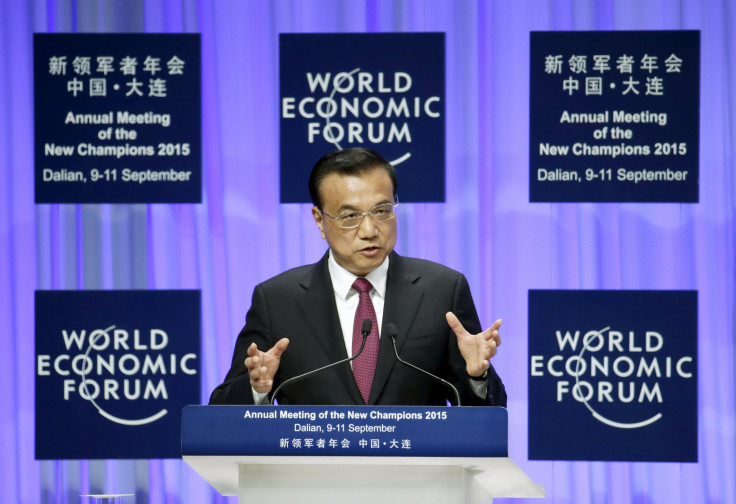China's Premier Li Says Growth Remains Strong

DALIAN, China -- Relax, planet earth. China is not going to bring down the world economy. On the contrary, China is no less than a crucial source of economic growth whose fundamentals remain healthy. So declared Chinese Premier Li Keqiang here Thursday morning at the World Economic Forum.
In a speech characterized by bold reassurances and scant attention to the specific issues fueling global unease about the implications of a slowing Chinese economy, the Premier labored to present his country as an eager buyer of world goods as well as a partner in tackling global problems.
"China is not a source of risk for the world economy but a source of strength," Li declared. "The positive factors in the economy are building up."
Whether that optimistic talk will be borne out by reality ultimately hinges on whether China continues to pull back on importing global wares -- not least, commodities -- as the world's second-largest economy continues to slow its pace of growth after three decades of breakneck development.
Around the globe, years of exuberance over the opportunities of a rapidly developing China have given way to gnawing fear over the impacts as China slows. Iron ore mines in Australia have prospered by feeding Chinese smelters that have forged the steel enabling high rises to fill out the skies of Chinese cities. Soy bean farms in Brazil and Argentina have seen explosive growth in supplying Chinese livestock operations scrambling to keep pace with rising appetites for meat. Oil producers from the Middle East to Russia have in recent years seen prices buoyed by relentless demand from China.
Now, as China's economic activity slows, prices are falling for all of those commodities. Iron ore is going for about $58 a ton after dropping to a 10-year low of $44.10 in July while oil prices have plunged by over 50 percent since June 2014. And, earlier this month, the International Monetary Fund identified falling commodity prices as a major threat to the world economy after prices hit 13-year lows in August.
Investments are being curtailed, raising the prospect of lost jobs and diminished spending power on every shore touched by China trade. In Russia, President Vladimir Putin's plans to reduce the dependence of the country's energy sector on European demand with the help of trade deals with China is now in jeopardy. According to OECD data, cited by the Economist, a 2 percent dip in China's domestic demand over two years could bring down worldwide growth -- which has averaged about 3 percent since 2008 -- by 0.3 percentage points a year. And the impact would be all the more acute in China's major trading partners such as Japan, as well as in the eurozone and the United States.
Premier Li used his speech to try to undercut the notion that weak global demand for goods and services can be blamed on China's moderating growth. Chinese tourists are increasingly traveling the world, he said, "not just for sightseeing, but also for shopping." Even as it slows, China's economy grew at a 7 percent annualized pace over the first half of the year, he added, and per capita disposable income grew faster than that.
Overall Chinese imports are diminishing in dollar terms, but that reflects the fall in commodity prices, Li said. "We will only buy more from the world in the future," he said.
But China's official economic growth projections have been a source of deepening skepticism, with many economists estimating a pace of development that is weakening at a much faster rate. China expects its economy to grow 6.8 percent in 2015 -- down from 7.4 percent last year -- while the OECD believes the outlook continues to deteriorate for China, and predicts growth could further slow to 6.7 percent in 2016.
Strikingly, Li did not speak directly about the source of the greatest global anxiety over China's impacts on the world economy: the recent plunge in the nation's stock markets, which has provoked extreme volatility in other bourses from Tokyo to New York. "In the past two months, there have been slides and ups and downs in certain economic indicators," Li said, in what seemed an elliptical reference to the stock market pullback. Such volatility is "natural in a time of transition," he added.
Many analysts have noted that China's stock markets are relatively small, with fewer than 10 percent of Chinese households invested, making them of limited importance as a gauge of real economic prospects. But given that China's government has mounted extraordinary and public interventions in a failed bid to support share prices -- limiting sales and directing state entities to purchase shares -- the turbulence in the markets has been taken as a sign that China's leaders are not fully in control of economic policy.
As he stood on the stage at a conference center in this northeastern Chinese city, the center of the nation's industrial aspirations back in the days of chairman Mao, the Premier ultimately sought to convey the sense that China's best days are ahead.
"The Chinese economy will only have a brighter future," he said. "The Chinese economy is shock resistant and resilient."
© Copyright IBTimes 2024. All rights reserved.





















